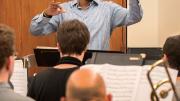Yosvany Terry might have become a clarinetist. About to begin conservatory training and unsure which instrument to focus on, the nine-year-old was considering the woodwind when he saw a TV ad featuring a saxophone—“and the rest is history.” Another fork in the road for the Latin Jazz artist, during his childhood in Cuba: random placement in an English, rather than Russian, language class. With a father who was a famous charanga (Cuban dance music) conductor, violinist, and chekeré player (the percussion instrument made of a hollow gourd covered in a net of beads), Terry and his brothers grew up serious about music, but also kept busy with other pursuits: math contests, volleyball, handball, and badminton. (His desire to learn tennis was thwarted, he jokes, because “it was a capitalist sport.”) Describing the “field research” central to his composition process, Terry cites the example of Bartók and Kodály collecting Hungarian folksongs. “I go to the countryside in the middle of nowhere”—recently, Cuba’s Matanzas and Villa Clara provinces—“and I get together with these old people” to learn about local instruments, chants, melodies, and ceremonies. Exploring the far-flung origins of Afro-Cuban jazz, Terry’s music has been praised for its “multilevel fluencies,” for delving into history while always pushing forward. He brings this momentum to his teaching, as the new visiting senior lecturer of music and director of jazz bands. A listener described Terry’s first rehearsal with the Harvard musicians as “a little like boxers circling each other, feinting, seeing how they will move,” but during their 90 minutes together, the band-leader “pulled them toward an idea of what he wanted,” and by the end, audience and band alike “could hear how far we had traveled.”
Portrait of Harvard director of jazz bands Yosvany Terry
Portrait of Harvard director of jazz bands Yosvany Terry
A well-traveled Afro-Cuban jazz musician lands at Harvard.

Yosvany Terry
Photograph by Stu Rosner
You might also like
Harvard’s Hasty Pudding Honors Rose Byrne
The Bridesmaids actress celebrated her 2026 Woman of the Year Award with a roast and a parade.
How a Harvard and Lesley Group Broke Choir Singing Wide Open
Cambridge Common Voices draws on principles of universal design.
Rabbi, Drag Queen, Film Star
Sabbath Queen, a new documentary, follows one man’s quest to make Judaism more expansive.
Most popular
Explore More From Current Issue

How a Harvard Hockey Legend Became a Needlepoint Artist
Joe Bertagna’s retirement project recreates figures from Boston sports history.

The Enterprise Research Campus in Allston Nears Completion
A hotel, restaurants, and other retail establishments are open or on the way.

Rabbi, Drag Queen, Film Star
Sabbath Queen, a new documentary, follows one man’s quest to make Judaism more expansive.




